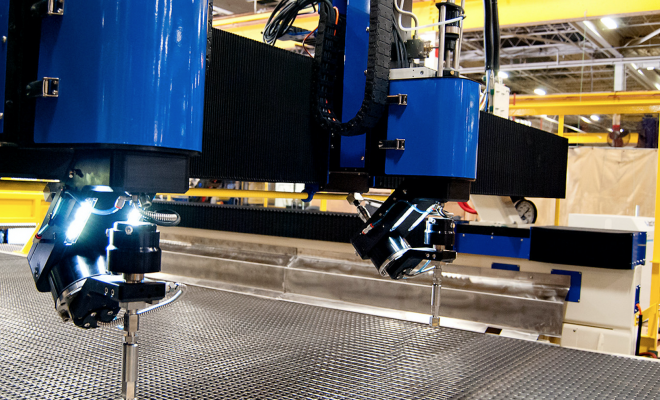 "WARDJet" Courtesy of WARDJet; License: (CC BY-SA 2.0)
"WARDJet" Courtesy of WARDJet; License: (CC BY-SA 2.0)
Politics
Is Trump Prepared for Automated Manufacturing?
During his campaign, President Donald Trump promised to create 25 million new jobs over the coming decade, many of which he claimed would come from the revival of U.S. manufacturing. Trump is firm in his belief that low taxes and protectionist trade policies will create the jobs he promised, in spite of the fact that jobs in manufacturing have been in steady decline for decades. However, even if manufacturing does return to U.S. shores, automation means longterm blue-collar job growth, as prophesied by Trump, is unlikely. Trump is by no means ideologically suited to oversee the inevitable march towards automation.
Protectionists on both the left and right argue that free trade has allowed companies to expand profit margins by moving their manufacturing bases to the global south, where labor costs are significantly lower, and finished products exported to the global north for consumption avoid the costs of high tariffs. As manufacturing automates and the cost of labor becomes irrelevant, the global south will lose comparative advantage. China’s shift towards automation and their drive to create a consumer economy is indicative of the dwindling labor advantage in the global south.
Increasingly, it will make sense for firms to establish automated factories closer to their consumer base as a means of cutting transportation costs. Therefore, manufacturing could be returning to the U.S. irrespective of Trump’s policies. However, the return of manufacturing to the U.S. would not necessarily imply the preservation of existing blue-collar jobs or the creation of new ones.
The degree to which automation replaces human employees remains to be seen, but continued automation is generally considered inevitable. At the current rate, a jobless future could be a reality for many. But current policies would leave them destitute. Discussions surrounding automation have prompted many to argue in favor of reinventing social programs. Social programs that ensure a Universal Basic Income (UBI), a college education, healthcare, and housing are necessary if increasingly automated societies hope to ensure the wellbeing of all. However, such policies would be in diametric opposition to Trump’s economic perspectives.
Over the past few months, Trump has promised to slash government spending–particularly on social services. Trump believes welfare programs will be irrelevant in his “dynamic booming economy” where taxes are low, tariffs are high, and jobs are plentiful. However, if the president truly hopes his people are able to find long term employment in manufacturing, or any other industry, he had better think about developing skilled workers by investing in public schools and free college tuition. More likely, Trump will lead the “race to the bottom,” regardless of whether or not he revives U.S. manufacturing. Automation is a reality Trump has not considered, nor is he ideologically suited to do so.








Comments